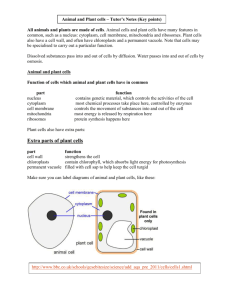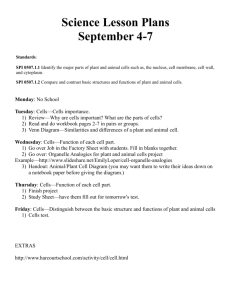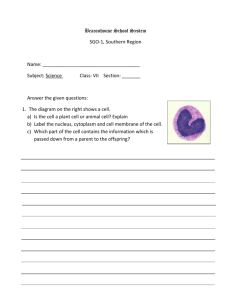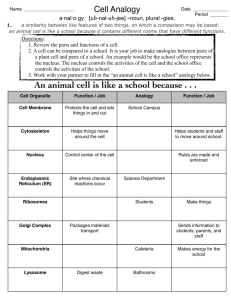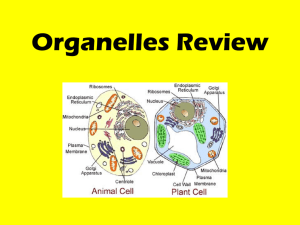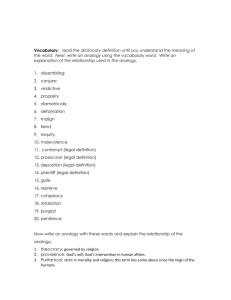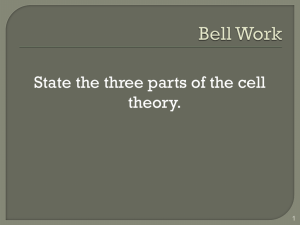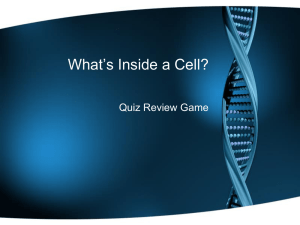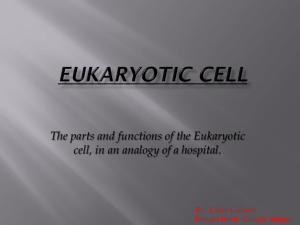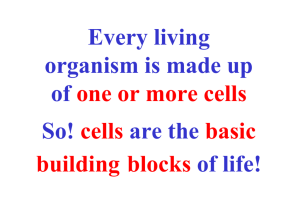File
advertisement
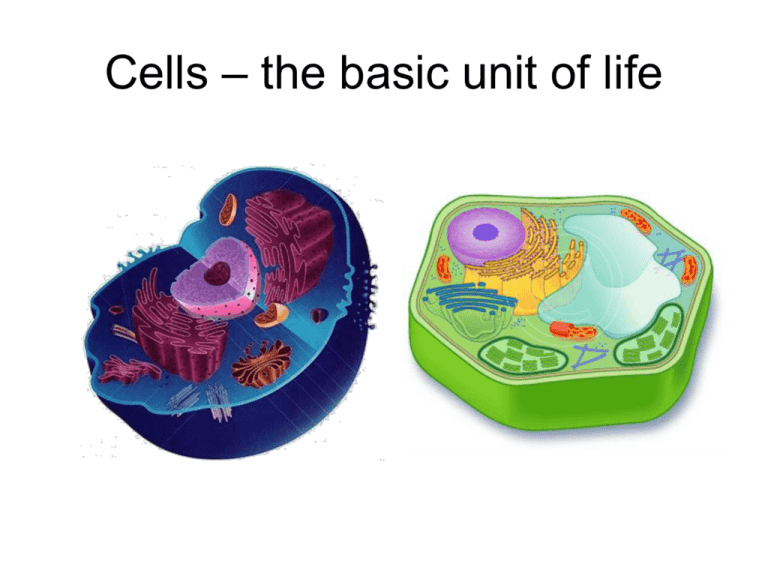
Cells – the basic unit of life Types of cells Prokaryotic • No nucleus • Very small • No membrane-bound organelles • Example: bacteria Eukaryotic • Has a nucleus • Larger (can see with a light microscope) • Has membranebound organelles • Examples: plant and animal cells Types of eukaryotic cells Plant cell • Has chloroplasts • Has a cell wall • Has a large, central vacuole Animal Cell • No chloroplasts • No cell wall • Only small vacuoles A) Cell Membrane/Plasma Membrane Cell membrane 1. Location: Surrounds outside of the cell. 2. Function: Regulates materials entering and exiting the cell. Analogy – City limits B) Cytoplasm Cytoplasm 1. Location: Inside of cell. 2. Function: All cell contents that lie between the cell membrane and the nucleus. (organelles + cytosol) a. Cytosol = liquid portion/non-organelles. Analogy – Everything in Rocklin, except City Hall C) Nucleus Nucleus 1. Location: Inside of cell (usually near the center) 2. Function: “Control Center.” Regulates DNA & RNA actions. Analogy – City Hall D) Nuclear Envelope Nuclear Envelope 1. Location: Surrounds outside of the nucleus. 2. Function: Regulates what enters or exits the nucleus. Analogy – Walls & Security Guard of City Hall E) Nucleolus Nucleolus 1. Location: Center of the nucleus. 2. Function: Produces rRNA (ribosomes), which are used to make all proteins. Analogy – City Engineering Office E) DNA – Deoxyribonucleic acid DNA (chromatin) 1. Location: Inside the nucleus. 2. Function: information on how to make proteins. Analogy – City Planning Office F) Endoplasmic Reticulum Rough ER Smooth ER 1. Location: Outside of the nucleus. 2. Function: Transportation route for proteins. a. Rough ER: has ribosomes b. Smooth ER: no ribosomes Analogy – City Streets & Country Roads G) Ribosomes Ribosomes Free Ribosomes 1. Location: On rough ER & floating in cytoplasm. 2. Function: Makes proteins. Analogy – Factories, Builders. H) Vacuoles & Vesicles Vesicles 1. Location: Floating in cytoplasm. 2. Function: Storage for water, nutrients or waste. Analogy – Grocery stores, water tanks. I) Lysosomes Lysosomes 1. Location: Floating in cytoplasm. 2. Function: packets of enzymes that break down materials in a cell. Analogy – Recycling center J) Mitochondria Mitochondria 1. Location: Floating in cytoplasm. 2. Function: Produce energy for the cell – site of respiration. “The Powerhouse” Analogy – PG&E K) Golgi Apparatus Golgi Apparatus 1. Location: In cytoplasm, near cell membrane 2. Function: Packages, labels and ships proteins out of the cell. Analogy – UPS L) Cytoskeleton Microfilaments Microtubules 1. Location: Floating in cytoplasm. 2. Function: Provide support and structure for the cell. Analogy – Wood, cement, steel beams M) Centrioles Centrioles 1. Location: Floating in cytoplasm. 2. Function: microtubules that help divide the cell during cell division. Analogy – Rocklin High School vs. Whitney High School N) Chloroplasts (Plants only) Chloroplasts 1. Location: Floating in cytoplasm 2. Function: site of photosynthesis (converting sun and CO2 into sugar). Analogy – Solar Powered Bakery O) Cell Wall (Plant cells only) Cell Wall 1. Location: Surrounding cell 2. Function: Provides support for the cell a. Made of cellulose Analogy – rock wall P) Cilia & Flagella Flagellum Flagella Cilia 1. Location: Outer surface of cell 2. Function: provides movement for the cell or objects moving by the cell. a. Flagella – 1 long fiber b. Cilia – many short fibers Analogy – Cars or bicycles. Cell Video https://Cell Video https://www.youtube.com/watch?v=URUJD5NEXC8
